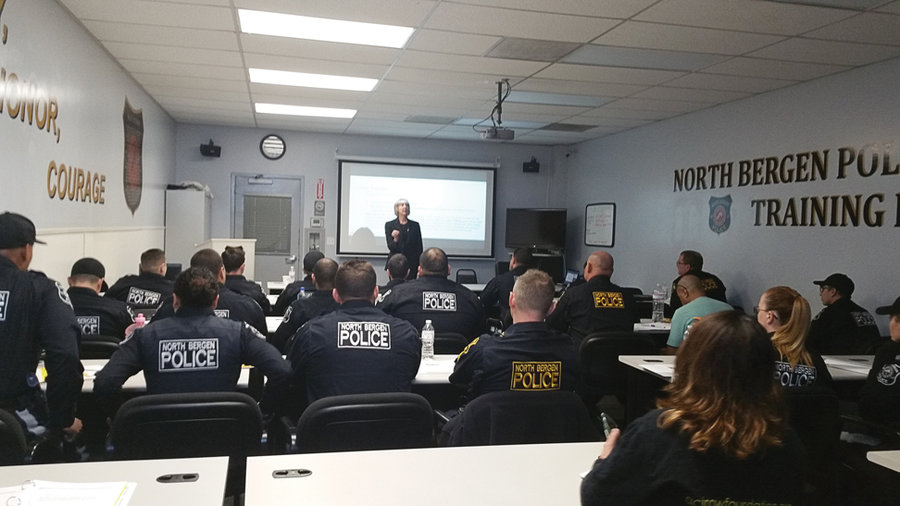The North Bergen Police Department had three days of training last week with Kristine Allen, president and co-founder of the Act Now Foundation, a nonprofit organization that helps the public recognize signs of Alzheimer’s disease.
Each day was five hours of training by Allen using various scenarios and seminars. She taught the whole department how to approach someone with Alzheimer’s or dementia, and how to gain their trust to help them.
“They are learning how to positively approach someone physically and verbally with Alzheimer’s in order to deescalate an aggressive situation.” – Kristine Allen.
____________
“We’re teaching them to recognize someone who has Alzheimer’s or dementia, compared to someone who is on alcohol or drugs,” Allen said. Some typical behaviors from someone with the disease are delayed response, confusion, inability to follow a train of thought, or becoming easily agitated.
Officer Santos Benitez said he’s seen plenty of people with Alzheimer’s while working as an EMS in Union City.
“They’re hard to pick up, but not after this training,” Benitez said.
“It’s a stressful situation for them. They can act out, run off, or get worked up and want to leave,” Allen said. “You have to try to gain their trust, and once they trust you they’ll follow instructions, like needing to evacuate or escorting them to safety.”
“Knowing the proper steps to deal with a person with dementia goes a long way for first responders,” said Chief of Police Robert Dowd. “This training will provide members of the department with the tools needed to better handle an already tough situation.”
Officer Gleny Henry said she encountered a missing person with Alzheimer’s while she was off duty near her home three years ago. “I recognized the reported missing person, but I saw her off-duty. I had to call dispatch,” Henry said.
This summer Officer Jason Castillo saw a lady with Alzheimer’s wandering around at a gas station. She was wearing a night robe at the time.
“I had difficulty communicating with her. I asked neighbors if they knew who she was, and they directed us to where she lived,” Castillo said. Castillo took her to her home three blocks down.
“I learned a lot of information from the class. I knew a little about the disease, but not to this extent. I learned about the late development of Alzheimer’s and how it puts holes in the brain,” Henry said. “I also learned that most people with Alzheimer’s die from cardiac arrest.”
“I got a better understanding of how to approach people with the disease, how to show them to trust me, to smile, and to give a handshake before asking questions,” Castillo said.
Support groups
The Hudson County Sheriff’s Department has free wristwatches and radio transmitters that track those with Alzheimer’s. The support group called Project Lifesaver provides the devices free for families. The person who needs to be tracked can wear the watch and the family has a radio transmitter at home that tracks them.
The device can also be used on children with Downs syndrome, autism, cognitive disorders, or traumatic brain injuries.
The project enables a quick response from the Sheriff’s Department if a lost one wanders away from home, or becomes confused. The only cost involved would be for the necessary change of the battery in the radio transmitter.
For more information contact the Hudson County Sheriff’s Office, Community Relations Unit at (201) 217-5226.
